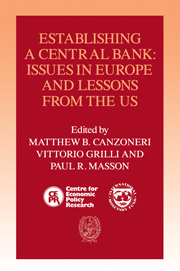Book contents
- Frontmatter
- Contents
- List of figures
- List of tables
- Preface
- List of conference participants
- 1 Introduction
- PART I THE DESIGN OF A CENTRAL BANK
- 2 Designing a Central Bank for Europe: a cautionary tale from the early years of the Federal Reserve System
- 3 The European Central Bank: reshaping monetary politics in Europe
- 4 The ECB: a bank or a monetary policy rule?
- PART II TRANSITION FROM NATIONAL CENTRAL BANKS TO A EUROPEAN CENTRAL BANK
- PART III FISCAL POLICY REQUIREMENTS OF A COMMON CURRENCY AREA
- PART IV GLOBAL IMPLICATIONS OF A EUROPEAN CENTRAL BANK
- Index
3 - The European Central Bank: reshaping monetary politics in Europe
Published online by Cambridge University Press: 05 March 2012
- Frontmatter
- Contents
- List of figures
- List of tables
- Preface
- List of conference participants
- 1 Introduction
- PART I THE DESIGN OF A CENTRAL BANK
- 2 Designing a Central Bank for Europe: a cautionary tale from the early years of the Federal Reserve System
- 3 The European Central Bank: reshaping monetary politics in Europe
- 4 The ECB: a bank or a monetary policy rule?
- PART II TRANSITION FROM NATIONAL CENTRAL BANKS TO A EUROPEAN CENTRAL BANK
- PART III FISCAL POLICY REQUIREMENTS OF A COMMON CURRENCY AREA
- PART IV GLOBAL IMPLICATIONS OF A EUROPEAN CENTRAL BANK
- Index
Summary
Introduction
One of the most challenging tasks in the process of European integration is the creation of new institutions, such as the European Central Bank (ECB). Important and difficult questions need to be addressed in this process, such as: how independent should the European Central Bank be from political institutions? What voting rules should be adopted by the governing board of the ECB, when deciding about European monetary policy? How do we ensure that the preferences of European citizens will be reflected in the choice of policies of the ECB?
The governors of the twelve central banks of the EEC countries have recently proposed a statute for the ECB which provides some answers to these questions. The purpose of this paper is to address these issues and evaluate the proposed statute from the point of view offered by recent politico-economic models of monetary policy. In particular, we focus upon the trade-off between the objectives of low inflation and output stabilization.
We begin by considering, as a benchmark, the situation in which the political integration of Europe has been completed, so that one can think of a ‘European nation’ with its legislature and executive. Following Rogoff (1985), we show that the legislature (universally elected in this new ‘European nation’), has an incentive to set up an independent Central Bank, and to appoint a governor who is more ‘inflation-averse’ than the European median voter.
- Type
- Chapter
- Information
- Establishing a Central BankIssues in Europe and Lessons from the U.S., pp. 49 - 85Publisher: Cambridge University PressPrint publication year: 1992
- 45
- Cited by



